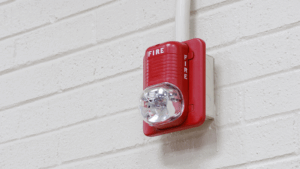 There are approximately 3,000 commercial fires in the United States every year, causing millions of dollars in property damage. Needless to say, fire alarm systems are essential to any commercial setting. They alert the building’s inhabitants of a fire, allowing them ample time to safely exit the building and notify emergency responders
There are approximately 3,000 commercial fires in the United States every year, causing millions of dollars in property damage. Needless to say, fire alarm systems are essential to any commercial setting. They alert the building’s inhabitants of a fire, allowing them ample time to safely exit the building and notify emergency responders
In this blog, we will highlight the importance of fire alarm system maintenance and provide a general overview of its maintenance schedule. If you are looking for advanced fire alarm system design and installation to help you keep your facility safe, contact us!
Why Fire Alarm Systems Need Maintenance
Like most safety systems, fire alarm systems need regular maintenance to ensure their effectiveness. In fact, maintenance is often mandated by both local and national codes, like NFPA 72. Regular maintenance prevents malfunctions and ensures the system operates correctly in an emergency.
The lifespan of your fire alarm system can be improved with regular maintenance as well. Regular checks and upkeep can help prolong the life of the system, saving money in the long run. It can also identify issues that may lead to expensive and disruptive false alarms.
One of the biggest advantages of regular maintenance for fire alarm systems is peace of mind, knowing your alarm system is in good working order and that your building’s inhabitants are safe.
Key Components and Their Maintenance
What factors go into maintaining a fire alarm system?
- Control Panel: the central hub of a fire alarm system. It acts as the brain of the system, receiving signals from various detectors and pull stations, processing this information, and alerting inhabitants and authorities. They need regular battery and communication testing, and will sometimes need to be replaced.
- Initiating Devices: the physical components of your system, which are integral to its efficiency. This includes your smoke detectors, heat detectors, and pull stations. These will need to be cleaned and tested frequently, and detectors in particular need to be tested for sensitivity.
- Notification Appliances: the sensory aspect of your fire alarm system. This includes horns, strobe lights, and speakers. They require audibility and visibility checks, as well as synchronization testing.
- Wiring and Connections: the glue that holds it all together. Like any other electrical system, they need to be inspected for damage, corrosion, and secure connections.
General Maintenance Schedule Overview
How often should you perform maintenance on your fire alarm systems? Let’s take a look at some options:
- Daily/Weekly: The owner or occupants of the building should be checking fire alarms daily/weekly to detect obvious issues like broken indicator lights or obstructions. This doesn’t have to be intensive, just a brief glance over.
- Monthly: Functional tests can be performed monthly by a professional if applicable.
- Annual: Annual tests are an important aspect of preventative maintenance. Certified technicians will test, inspect, and maintain your system, fixing any problems along the way.
- Other: When repairs are made, sometimes technicians need to return for follow-up inspections, general maintenance, or modifications.
Choosing the Right Fire Alarm System Partner
The importance of a working fire alarm system cannot be overstated. Selecting a qualified life safety systems company to perform regular maintenance checks can give you peace of mind. If you are looking to prioritize maintenance and improve safety, contact Wilson Fire Equipment!
